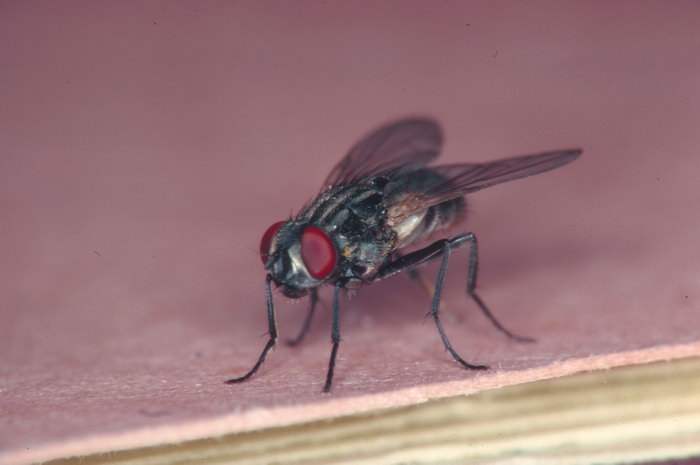(单词翻译:单击)
听力文本
This is Scientific American — 60-Second Science. I'm Christopher Intagliata.
As soon as a person dies, decomposition begins. And the first visitors arrive. "Within five to 15 minutes of death, blowflies or other insects begin to colonize the body." Rabi Musah, an organic chemist at the University at Albany.
She says different species turn up at different stages of decomposition. "So because of that, depending upon what entomological evidence you find, you can learn something about when the person died in terms of the timing of the death."
Flies don't tend to stick around when disturbed—by detectives, for example. But they do leave behind eggs. The eggs are hard to tell apart by appearance alone, so forensic entomologists rear them until they hatch, a few weeks later—and they get a species ID and, with a little guesswork, a person's time of death.
But Musah has come up with a less time-intensive approach: chemical analysis of the eggs. She and her team investigated that method by first harvesting flies with pig-liver traps stashed throughout New York City. "So it turns out that it's easy to hide pig livers in various parts of Manhattan. There's a lot of foliage and whatnot, they are easy to hide, so no one knew."

They collected the trapped flies and then chemically analyzed their eggs. And it turns out each species of fly egg has a unique chemical fingerprint—enough to tell the bugs apart without raising the eggs to maturity. And in a useful twist, the technique uses eggs preserved in alcohol—eggs that wouldn't be viable for rearing live insects anyway. The study is in the journal Analytical Chemistry.
Musah and her colleague Jennifer Rosati are now testing the method on a real case. "And once we do that we will be publishing some case studies to illustrate that this is a method that can be used, and hopefully eventually it's something that will stand up in court."
And something that could speed up detective work—or help revive a cold case.
Thanks for listening for Scientific American — 60-Second Science Science. I'm Christopher Intagliata.
参考译文
这里是科学美国人——60秒科学。我是克里斯托弗·因塔利亚塔。
人一死亡,分解过程就开始了。参与分解的首批访客也随之而来。“人死后五到十五分钟内,苍蝇或其他昆虫便开始占领尸体。”奥尔巴尼大学的有机化学家拉比·穆萨说道。
她表示,不同物种在不同的分解阶段出现。“因此,依据发现的昆虫学证据,可以从昆虫的死亡时段来了解死者的死亡时间。”
当受到干扰时,苍蝇便不会在附近逗留,比如它们会被侦探打扰。但是它们会留下卵。仅凭外观很难分辨这些是哪种昆虫的卵,所以法医昆虫学家会把它们养大直至孵化,几周后他们就会知道这是哪个物种,再稍加猜测,便可推断出一个人的死亡时间。
但是穆萨提出了一种更省时的方法:对虫卵进行化学分析。她和她的团队将猪肝藏到纽约市各处,作为诱饵来诱捕苍蝇,以此来对这种方法进行研究。“结果发现,在曼哈顿各个地方藏猪肝很容易。有很多植物树叶可以藏东西,没人会知道。”
他们将捕获的苍蝇收集起来,然后用化学方法分析蝇卵。结果发现,每种蝇卵都有一种独特的化学指纹图谱,不用等卵发育成熟也可以分辨它们。另外,这种方法还应用了将卵保存在酒精中的技术,使卵不能孵化出活体昆虫。这项研究结果发表在《分析化学》期刊上。
现在,穆萨和同事詹妮弗·罗萨蒂将在一个真实案例上测试这种方法。“进行测试以后,我们将发表一些案例研究结果,以证明这种方法可行,希望它最终成为在法庭上站得住脚的证据。”
而且这种方法还能提高破案效率,或在破解悬案上提供帮助。
谢谢大家收听科学美国人——60秒科学。我是克里斯托弗·因塔利亚塔。
译文为可可英语翻译,未经授权请勿转载!
重点讲解
重点讲解:
1. as soon as 一…就…;
例句:As soon as we opened the front door we could smell the gas.
我们一打开前门,就闻到了煤气的味道。
2. tell apart 区分;区别;辨别;
例句:The twins look so much alike that you can hardly tell them apart.
这对双胞胎长得一模一样,简直分不出谁是谁。
3. come up with 想出,提出(计划、想法等);
例句:I've racked my brains, but I have not yet to come up with any solution to the problem.
我已经绞尽脑汁了,但是还没给那个问题找到任何答案。
4. stand up (要求或证据)经得起检验,能够成立;
例句:He made wild accusations that did not stand up.
他的指控毫无根据,根本站不住脚。


